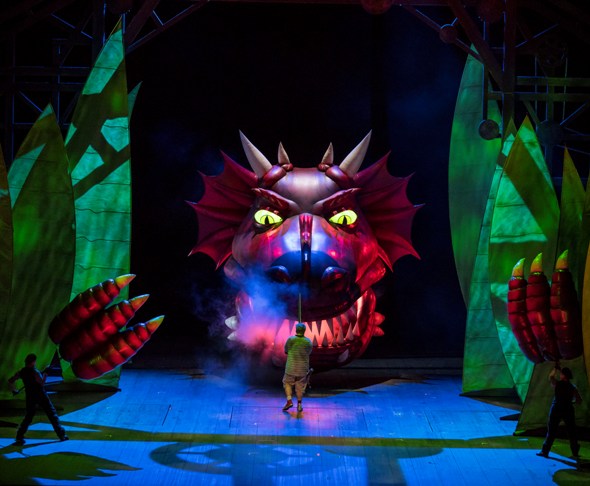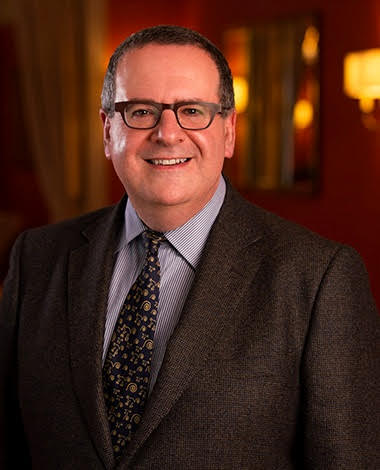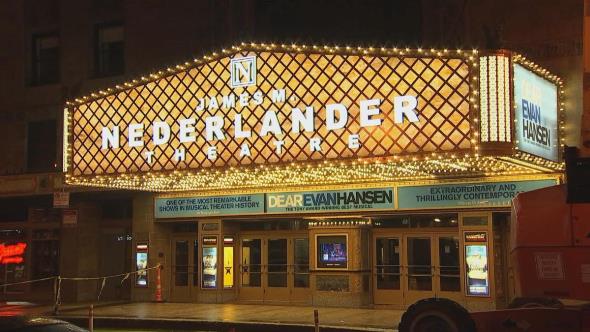Stages of Silence: Lyric cancels ‘Ring’ cycle; CSO and Chicagoland theaters also go dark

Fafner the fearsome dragon in Wagner’s “Siegfried” can go back to sleep. Lyric Opera’s “Ring” cycle, set to begin April 13, was canceled. (Todd Rosenberg photo)
Report: Governor’s mandate limiting size of gatherings, in effort to contain virus, prompts widespread cancellation of performing arts.
Update: In New York City, Carnegie Hall on March 16 became the country’s first major arts presenter to extend its shutdown to May 10, from March 31, in response to the CDC’s recommendation against public gatherings of more than 50 people for the next eight weeks.
By Lawrence B. Johnson
It was a day to give Friday the 13th a bad name. Lyric Opera of Chicago made the unavoidable but nonetheless stunning decision to cancel the whole of its long-anticipated cycles through Wagner’s “Ring” tetralogy.
The Chicago Symphony Orchestra essentially placed its virtuoso forces on paid leave.
Broadway in Chicago shut down its main presentations in the Loop. One after another, theaters large and small posted immediate stoppage of whatever was on their stages along with cancellation of the show to come.
All in response to the vital need to limit the spread of coronavirus and the disease it can engender, COVID-19. While small theaters like A Red Orchid, Griffin and Jackalope might have opted to remain open, grander stages like Chicago Shakespeare, Goodman and Steppenwolf in Chicago, Northlight in Skokie and Writers in Glencoe acted in compliance with Gov. J.B. Pritzker’s mandate March 12 prohibiting public assemblies of more than 1,000 people.

Lyric Opera general director Anthony Freud: “A lot of tears onstage” when he announced cancellation of the “Ring.” (Todd Rosenberg)
Every fateful announcement came with artistic and administrative expressions of deep regret tempered by a sense of civic accountability. Nowhere could that pain have been felt more deeply than at Lyric Opera, where a decade of planning and three stage productions aimed at bringing Wagner’s vast “Ring” operas to life, in three cycles starting April 13, was suddenly dashed, the whole passionate, laborious and costly enterprise terminated in an instant.
“It’s heartbreaking, as you can imagine,” Freud said in an interview later in the day March 13. “There were a lot of tears onstage when I announced it to the company this afternoon. But (not canceling) would have been contrary to both the letter and the spirit of the governor’s mandate. We want to be responsible citizens. There are more questions than answers right now. This is a very surreal moment.”
Freud acknowledged that Lyric’s financial loss would be substantial and said that assessment, including settlements with artists and stage hands, was just beginning. “We can’t yet know what the long-term impact will be,” he said. “Frankly, ticket sales have dried up. This is all untried and untested. Regular assumptions just don’t apply.”
Also lost in the coronavirus chaos was Lyric’s new production of the final opera in the “Ring” cycle, “Götterdämmerung,” which was scheduled to open April 4 for the first of two “warm-up” performances. Noting that opera planning is always a multi-year proposition because singers and conductors are booked several seasons ahead, Freud said Lyric couldn’t just insert “Götterdämmerung” next year.
Still, he was philosophical about the set-back. “We did new productions of the first three operas, and we were well into rehearsals for ‘Götterdämmerung,’” he said. “The ‘Ring’ is one of the great masterpieces, and Lyric is a great opera company. Lyric and the ‘Ring’ will be together again.”
Like the Chicago Symphony Orchestra, the opera company now holds the cash from thousands of ticket purchases for canceled events. Both institutions will present their patrons with the same three options: leave that expenditure on account and apply it to a future performance, consider it a donation or request a refund.

Everyone at the CSO will continue to be paid. “We decided that very quickly,” said president Jeff Alexander.
CSO president Jeff Alexander said the orchestra will basically approach its corporate concert sponsors with similar choices. Donate the funds already dedicated to underwriting specific concerts that are now canceled or reassign that sponsorship to a future event.
“Most of our donors are experienced and take the long view,” Alexander said. “But much can depend on how the stock market goes. History shows that even when the stock market makes a big drop, it will come back up.”
Alexander noted that the CSO’s cessation of activities will encompass 29 concerts at Orchestra Hall plus another 50 performances at Chicago area schools and community centers during the mandated shutdown of 30 days. During that hiatus, the musicians and administrative staff will continued to be paid. “We decided that very quickly,” Alexander said. As for what comes next, the CSO’s chief executive said it’s strictly wait and see: “When we get the all-clear to open our doors, we will resume giving concerts.”
Meanwhile, Chicago Symphony enthusiasts can still hear the orchestra streamed in its CSO Broadcast Series of archived concert recordings.
Late in the day March 14, CSO music director Riccardo Muti issued the following statement from his home in Ravenna, Italy, a country that has been under general lockdown for several days:
“To the citizens of Chicago, to the wonderful audience of the Chicago Symphony Orchestra and to the audience of all the cultural institutions in the city:
“My thoughts are with you, who, as all of us in Italy and most of Europe, are living through this time without the spiritual food of culture in general and of music in particular. I am certain that we will get through this difficult time, and my wish is that all the citizens of Chicago and our audiences remain optimistic. My thoughts and those of my fellow Italians are with you, remembering that we are all brothers and sisters.”
Muti is next scheduled to appear with the CSO at Orchestra Hall for concerts beginning April 23.
Theater buffs saw their favorite haunts shuttered in rapid succession on March 13. The announcements of darkened houses came in a steady stream throughout the day. High-profile venues like Goodman and storefronts like Shattered Globe joined a heavy-hearted parade of closures that truncated current shows and precluded productions on deck.
TimeLine Theatre’s press release declaring the mid-run termination of james ljames’ “Kill Move Paradise” might have been a template for proclamations coming from companies across the city: “We are following suit with other organizations and canceling all remaining performances. While much in the news is about restricting gatherings at venues (and) events of 250 people or more, we are focused on doing everything we can to support the health and safety of all of our patrons. We feel we have an obligation to public health and to our audiences, staff, and artists to take this step.”
And then, this: “We will continue to monitor any developments with the COVID-19 pandemic and should any developments affect future production dates, we will let you know.”
But on Friday the 13th, nobody knew when this blackout would be lifted – when we will hear, as the CSO’s Jeff Alexander put it, the all-clear.


